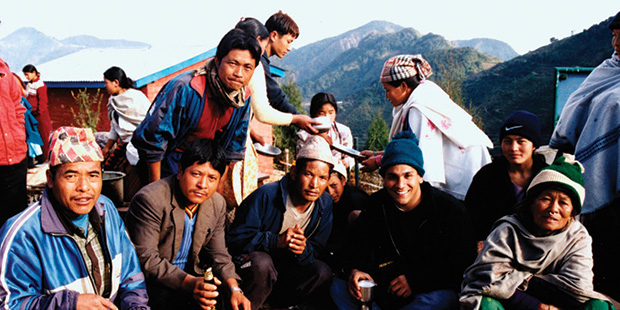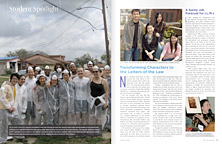A Peace Corps Volunteer Stays Close to the Lives He Changed
Printer Friendly VersionRajeev Goyal ’06 is living proof that one person can make a difference. As a Peace Corps volunteer assigned to teach English in eastern Nepal, he was facing a roomful of empty desks each day. Why? The children were spending hours walking to and from the nearest river to procure water for their families.
Goyal decided something had to be done so that the villagers could both have accessible water and allow the kids to get an education. “When I got to Namje, in the Dhankatu district, it was the driest part of the season,” he says. “People called the place ‘a fish out of water.’ It was a two-hour walk from the village to the river, and the children had to fetch water every morning.”
Goyal arranged a community meeting to propose the creation of a pump system—not that he knew the first thing about engineering a water supply. “I was hesitant at first because it was a part of the culture and the economy to fetch water. I didn’t want to disturb that,” says Goyal, who also thought his outsider status as an Indian- American might be an obstacle. “But the villagers basically said, ‘If you organize the infrastructure, we’ll build it.’”
And that’s exactly what happened. For 16 months, Goyal, in addition to teaching, helped carry pipes and 25-pound bags of concrete through mountainous terrain. He contributed more than sweat equity, too, raising $30,000 through grants and private donations. Though he hadn’t yet attended a minute of law school, Goyal also had the foresight to draft bylaws to govern the new system, guaranteeing jobs for those displaced by its construction.
On July 21, 2003, water trickled for the first time from 22 public spigots around the district. Daily rhythms in the village changed dramatically as a result.
The project changed Goyal’s ideas about his own goals, too. During the year, he had been accepted to the Law School but now he wasn’t so sure about leaving the village that had become like a second home. A discussion with a Nepalese neighbor, Tanka Bhujel, the vice principal at the school where he worked, sealed Goyal’s eventual choice. Bhujel told him, “If you go to law school, you’ll have access to resources. You’ll still need us, and we’ll still need you.”
Goyal has likely exceeded Bhujel’s expectations; during his three years at the Law School Goyal raised approximately $70,000 for “Hope for Water” and its sister program, “Hope for Education,” which provides support to schools in Dhankatu. He returned to Nepal six times while attending NYU, and witnessed the district’s transformation into an independent and viable community. The water system has also grown; 150 spigots deliver a daily allowance of 300 liters of water to most residences. Engineering jobs were created to keep the community selfsufficient; a cottage-industry cooperative occupies the women who no longer have to transport water in containers; and the district has so far turned a $5,000 profit by selling water to other villages.
Despite being singled out at graduation ceremonies with the Eric Dean Bender Prize in recognition of his outstanding commitment to public service apart from Law School commitments, Goyal is modest about his achievements. At press time, he was studying for the bar and planning a visit to Nepal after the test. “I never imagined,” he says, “that I had the power to alter someone else’s life.” Clearly, he also had the power to change his own.

